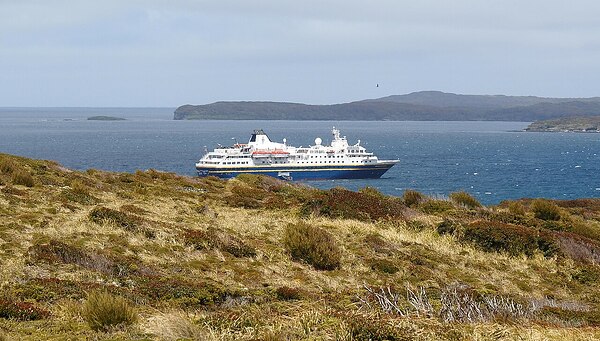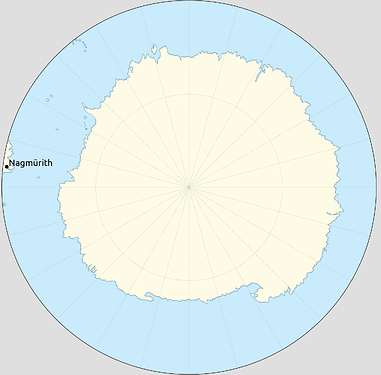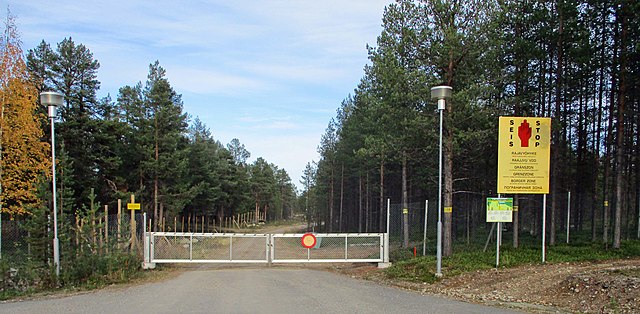From the Pelachis Observer
Attending Mærhalen Summit, Government Signals Concessions To Irredentists
The Observer sends thanks to @Norgsveldet for co-writing
A border crossing between Hlenderia and Joralesia, with signage in multiple languages.
Mærhalen, Tangrland - Mærhalen, the capital city of Gondwana’s second most populated country, Tangrland, is hosting a diplomatic summit between the representatives from Tangrland, Meremaa and Hlenderia. The summit is hosted and organized by Minister-President Sigrid Basgu who proclaimed that the summit is to promote cross Gondwanan cooperation and what she described as a shared opposition to continued Morstaybishlian colonialism in Gondwana. With Mrs. Basgu arguing on increasing cooperation between the three participating countries in economic and security fields.
The Prime Minister of Meremaa, Talinat Dusmas, is also joining the summit with her stating that she looks favorably to increasing its already close ties with Tangrland and to starting a closer relationship with Hlenderia. With her claiming that the summit will also include conversations about NCEF investment and financial aid to Hlenderia. When asked for a comment before the summit about Meremaa’s interest she simply proclaimed that. “My nation has always taken the position that Gondwana is vital now more than ever for the NCEF. If I can help start a larger conversation within the NCEF in our partnerships and relations with other Gondwanan states then I will do it.”
When Minister-President Sigrid Basgu was asked about Tangrland’s agenda for the summit she stated that: “Gondwanan nations must work closer together in opposition to old and new imperialism from foreign states, with focus on promoting and protecting our diverse and distinct cultures. All the participants have our disputes and issues with Morstaybishlia, I think we have a greater ability to solve them If we work together rather than separately.”
It is widely believed that Hlenderia is attending the summit on the urging of internal factions that believe the island nation has a claim on the Morstaybishlian colony of Joralesia, on its northwestern border. The Hlenderian government itself does not formally claim Joralesia as part of its national territory, but the country’s elected King, Yendrin, and its head-of-government, Grand Council President Marsilamat Indari, have ties to revanchist elements.
Likely to tamp down rumors of an imminent change in the government’s policy towards its neighbor, Hlenderia is sending a legislator, Councillor Gilantus Relennu, to the summit in Tangrland in lieu of the King or President. When approached for comment, Relennu said: “Hlenderia has always opposed the efforts of foreign colonizers on our island, and in South Gondwana generally. If Tangrland and Meremaa share our sentiments, and wish to discuss avenues to jointly empower formerly colonized nations on the continent, the Commonwealth is happy to oblige.”
The Hlenderian public’s response to what some call “the question of the Northwest Provinces” is varied, with a majority opposing efforts to lay claim to Joralesia, and a vocal minority supporting it. If, as Relennu suggested, the government will frame its approach as one of “anti-colonialism”, it may follow up with attempts to build a coalition between right-wing irredentists and left-wing anti-colonialists.
The results of the upcoming summit will be closely followed, and we will report on events there as they occur.
OPINION: Mærhalen Summit Puts Gov’t in Awkward Position
Gavikwaris Berrith served on the Grand Council of Hlenderia from 1978-2015, where he was a member of United Vrotrim. He served as Chair of the Appropriations Committee from 1987-1995, and Chief of the Natural Resources Bureau from 1995-2000. Upon his retirement, he became a political analyst for the Norrith Observer.
Since I left my seat on the Grand Council, the government has made a right turn on its approach towards international diplomacy. As recently as 2013, my colleague Gilantus Relennu of the Traditionalist Kwarim said, “there is nothing across the northern straits or the wide ocean that has any bearing on Hlenderia”. In January, Relennu enthusiastically supported the government’s application to the International Forum, and was rumored to have been in contention for the ambassadorship to that body (Avi Releth proved to be the government’s choice for that position, likely because he was never as proudly xenophobic as Relennu).
I was happy to see this sea change in Hlenderian foreign policy, even if I was watching it as a retiree. Unfortunately, the government’s recent decision to send Relennu to the upcoming Mærhalin Summit in Tangrland makes clear what King Yendrin and President Indari’s intentions were with this pivot: to use the language of liberal diplomacy to advance its unrealistic territorial claims with regards to Joralesia. In Mærhalen, Relennu will be surrounded with representatives from Tangrland and Meremaa, all too happy to commisserate with him over centuries-old grievances.
Since the passage of treaties ceding Joralesia to Great Morstaybishlia centuries ago, irrendentist Hlenderians have pushed for the return of what they call the “Northwest Provinces”. For most of Hlenderia’s history, however, we have also understood the impossibility of reneging on those treaties. It is only with the dawning of the modern era, and Hlenderia’s economic development of the past 20 years, that this issue has returned to the forefront of political discussion. I remember in 1989 when King Yendrin, then a fellow Councillor, spoke aggressively on the floor of the Grand Council of the need to retake Joralesia, and in 1997 when now-President Marsilamat Indari - then a fresh-faced Councillor replacing his mentor Meril Kwaran - told the press that by the end of the 21st century, Joralesia would once again be back in Hlenderian hands.
While this was happening, similar movements were taking place far to the north in Tangrland and Meremaa. With both nations having had a long dispute with Morstaybishlia and its overseas territories of Dalamaghar, Balidar and Kystland. Disputes which have its origins in the rivalries between the empires of Morstaybishlia and Norgsveldet. Though like Hlenderia it was not until the 21st century that these territories would be given new lime light, with the rise of the liberal irredentist ideology of Svendism in Meremaa having put new popularity for Pan-Meremain territorial claims. While in Tangrland the new administration under Minister-President Sigrid Basgu seems steadfast taking a more proactive stance in her recently independent nation’s foreign policy, which lead her to take a strong interventionist position in the Salisian Civil War. With her government escalating its support to Tangrianist separatists. Though Mrs. Basgu taken several democratic and federalist approach in her reform, her nation like ours seems to try to take a more aggressive approach to appease irredentists and nationalists.
Now, these personages will unite in Mærhalen for a summit to discuss how to press these historic claims. This puts our government in an awkward position. Unlike Meremaa and Tangrland, Hlenderia has never formally repudiated the Joralesian treaties. Nor is there a political will to do so. United Vrotrim, the largest party in the ruling coalition, rejects attempts to claim Joralesia in its party platform, and of my own Kwari People’s Party, more than half of its Councillors oppose the same.
The fact that King Yendrin and President Indari both support revanchist claims to the “Northwest Provinces” obscures the reality that the governing coalition, by and large, does not. The King’s own daughter, Yendrina - a Councillor for the Kwari People’s Party representing Kwarrōth’s Grant in Isher Province - opposes our country’s participation in this summit, saying that “it can only lead to further estrangement with our Morst diplomatic partners.”
Indeed it will. It is certain that Morstaybishlia will never give up its claim to the northwest corner of our island. And even if it did, how would our country integrate the millions of people of Morst descent living there? Would they give up their foreign style of governance, their “liberal democracy”, for our own native system? It is clear that the government is unable or unwilling to consider these questions. The irredentists’ “partners in crime”, the two Mūni parties, are clear on how they would answer these questions: Aleū-Mundasu Mishabit, of the Mūni Peoples Front, said in 2022 that “All foreign-colonists must be expelled from this island.”
The government should recognize the reactionary forces behind the recent rise in revanchism in our country and pull out of this summit. It is hypocritical to turn to foreign countries for support in ripping up the Joralesian treaties. How could Hlenderian word be trusted on any matter, if we would unite with other aggrieved parties to repudiate it afterwards?





